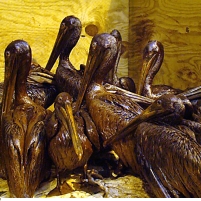Georgia Scientists Say At Least 70% of Spilled Oil is Still Unaccounted For
Thursday, August 19, 2010
 Pelicans awaiting cleaning, June 3, 2010 (photo: International Bird Rescue Research Center)
Pelicans awaiting cleaning, June 3, 2010 (photo: International Bird Rescue Research Center)
Contrary to the much-touted federal government report issued August 2 by the National Incident Command (NIC), the vast majority of oil spilled into the Gulf of Mexico from the Deepwater Horizon accident is still in the ocean. An assessment conducted by oceanographers of the Georgia Sea Grant program at the University of Georgia (UGA) concluded that between 70% and 79% of the estimated 200 million gallons of spilled oil has not evaporated or been burned, skimmed, recovered or dispersed. Georgia Sea Grant is federally funded by the National Oceanic and Atmospheric Administration.
“One major misconception is that oil that has dissolved into water is gone and, therefore, harmless,” Charles Hopkinson, director of Georgia Sea Grant and a professor in UGA’s Department of Marine Sciences, told Facing South. “The oil is still out there, and it will likely take years to completely degrade. We are still far from a complete understanding of what its impacts are.”
The Obama administration’s report indicated that nearly 75% of the oil was no longer a concern for the environment. According to the NIC report, one quarter of the 4.9 million gallons of oil that spilled into the Gulf of Mexico evaporated or dissolved, one quarter was removed through organized recovery, burning or skimming, one quarter was dispersed as microscopic droplets, either naturally or through the use of chemicals, and about one quarter is “residual,” meaning that it is still in the water or sand or has washed ashore.
But the Georgia Sea Grant report states that the media, in general, misunderstood the terms used in the NIC report. “The news media’s tendency to interpret ‘dispersed’ and ‘dissolved’ as ‘gone’ is wrong. Dispersed and dissolved forms can be highly toxic.” The report accepts that 10% of the oil was either burned or skimmed, but estimates that between only 4-8% was degraded by marine organisms and between 7-12% evaporated. That leaves 70-79% still in the ecosystem.
-David Wallechinsky, Noel Brinkerhoff
Scientists Say as Much as 79% of Oil Remains in Gulf of Mexico (by Kim Chipman, Bloomberg)
Outcome/Guidance from Georgia Sea Grant Program: Current Status of BP Oil Spill (by Chuck Hopkinson, Georgia Sea Grant) (pdf)
BP Deepwater Horizon Oil Budget: What Happened To the Oil? (National Incident Command) (pdf)
- Top Stories
- Unusual News
- Where is the Money Going?
- Controversies
- U.S. and the World
- Appointments and Resignations
- Latest News
- Trump Goes on Renaming Frenzy
- Trump Deports JD Vance and His Wife
- Trump Offers to Return Alaska to Russia
- Musk and Trump Fire Members of Congress
- Trump Calls for Violent Street Demonstrations Against Himself






Comments